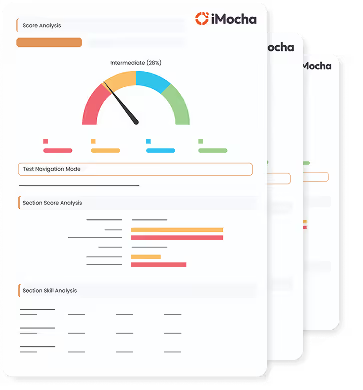


Choose easy, medium, or tricky questions from our skill libraries to assess candidates of different experience levels.
Choose easy, medium, or tricky questions from our skill libraries to assess candidates of different experience levels.

Choose easy, medium, or tricky questions from our skill libraries to assess candidates of different experience levels.

Choose easy, medium, or tricky questions from our skill libraries to assess candidates of different experience levels.
This a comprehensive PDF report, which you can instantly download and share with your hiring team or candidates for seamless collaboration.
Download Sample Report



The Talend Test helps recruiters and hiring managers evaluate a candidate's expertise in data integration using Talend. It enables organizations to streamline hiring for data engineering, ETL, and BI roles by validating skills in job design, connectors, transformations, scheduling, and error handling.





%20(1).webp)
Talend is an open-source data integration platform designed to convert, combine and update data in various areas across a business. Talend ETL tool is used for data integration (Talend open studio for data integration), data management, enterprise application integration, data quality, cloud storage, and big data.
Talend is the next-generation leader in cloud and big data integration software. It helps companies in making real-time decisions and become more data-driven. Using Talend, data becomes more accessible, quality enhances and can be moved quickly to the target systems.
Why use iMocha's Talend assessment test?
This Talend assessment test helps employers in many ways, including hiring job-fit candidates easily, making unbiased employee performance appraisal decisions, and reducing hassle in mass recruitment. You can minimize candidate filtration time by up to 85% with Talend ETL(v7) skills test.
Talend online test helps tech recruiters and hiring managers to assess candidates' skills in designing and developing Talend ETL processes. Talend assessment test is designed by experienced subject matter experts (SMEs) to assess and hire job-fit Talend developers as per industry standards.

Online Talend test helps to screen the candidates who possess traits as follows:
Talend online test has a powerful reporting feature that will help you get instant results and an option to share these results with your hiring manager /interviewer. Our test platform is secure and GDPR compliant to protect user data and privacy.
Hiring tests for Talend developers may contain MCQs (Multiple Choice Questions), MAQs (Multiple Answer Questions), Fill in the Blanks, Descriptive, Whiteboard Questions, Audio / Video Questions, LogicBox (AI-based Pseudo-Coding Platform), Coding Simulations, True or False Questions, etc.







.webp)
.webp)
.webp)
.webp)